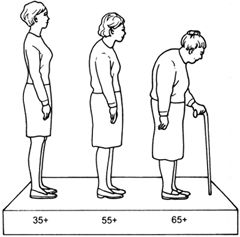-
(单词翻译:双击或拖选)
Osteoporosis
骨质疏松症
Today’s word is: osteoporosis!
Yep, osteoporosis. Now, you’ve heard this word before, and you know it has something to do with bones. But can you actually explain what it is?
The answer is straight-forward. It comes down to the fact that we human beings need calcium in our blood–it allows us to do all sorts of neat things, from contracting muscles to conducting nerve impulses. Where to get some calcium? Food is a good idea. But what if there isn’t always calcium-rich food to be had, as was probably the case for most of our long evolutionary1 history?
Best to store some for a rainy day. Store it where? The skeleton works! Then, when the blood runs low on calcium, a signaling device called the parathyroid gland2 can activate3 a process by which calcium is taken from the skeleton and put back into the blood.
Which is just what happens. This is a great short-term fix, but what about the poor skeleton? Eventually it will suffer from the loss of its own calcium–bones will become brittle.
What can we do? Two things. Help your body get more calcium by eating fatty fish and vitamin-D rich dairy products. Why vitamin D? Because that causes the small intestine4 to increase its calciumuptake, bypassing the need to grab extra from the bones. Under a doctor’s supervision, calcium tablets might also be helpful, along with the old standard–more exercise. Weight-bearing exercise helps keep bones strong and less likely to fall prey5 to the body’s own mechanisms6 in later age.
今天的词是:骨质疏松症!
是的,骨质疏松症。你以前听说过这个词,也知道它与骨头有关,但是你能解释它到底是什么吗?
答案很简单。它可以归结为一个事实,人类的血液里必须有钙,那样我们才能做各种事情,从收缩肌肉到神经冲动。钙从哪儿来呢?食物是不错的主意,但如果以后没有含钙丰富的食物,我们的后代应该怎么办?
我们要未雨绸缪,但是要储存在哪儿呢?骨骼上。那么,当流动的血液中钙含量过低,一个叫做甲状旁腺的发信号装置就会激活一个流程,致使骨骼中的钙流失到血液里。
那就是会发生的。这只是一种短期的修复,但是可怜骨骼怎么办呢?最后就会因缺钙,骨头会变得脆弱。
我们能做些什么?两件事。多吃富含脂肪的鱼和含有丰富维生素D的乳制品,帮助身体得到更多的钙。为什么是维生素D呢?因为它会使小肠增加它的钙摄取量,就不需要从骨骼中获取。在医生的监督下,钙片也可能是有用的,同时要多做运动。负重运动能够使骨骼强壮,在老年时期就不会为人体自身机制所折磨。
Notes:
fall prey to 成为 ... 的牺牲品, 深受 ... 之害
例句:
The zebra fell prey to the lion.
那斑马被狮子捕食。
 收听单词发音
收听单词发音
1
evolutionary

|
|
| adj.进化的;演化的,演变的;[生]进化论的 | |
参考例句: |
|
|
|
2
gland

|
|
| n.腺体,(机)密封压盖,填料盖 | |
参考例句: |
|
|
|
3
activate

|
|
| vt.使活动起来,使开始起作用 | |
参考例句: |
|
|
|
4
intestine

|
|
| adj.内部的;国内的;n.肠 | |
参考例句: |
|
|
|
5
prey

|
|
| n.被掠食者,牺牲者,掠食;v.捕食,掠夺,折磨 | |
参考例句: |
|
|
|
6
mechanisms

|
|
| n.机械( mechanism的名词复数 );机械装置;[生物学] 机制;机械作用 | |
参考例句: |
|
|
|


















